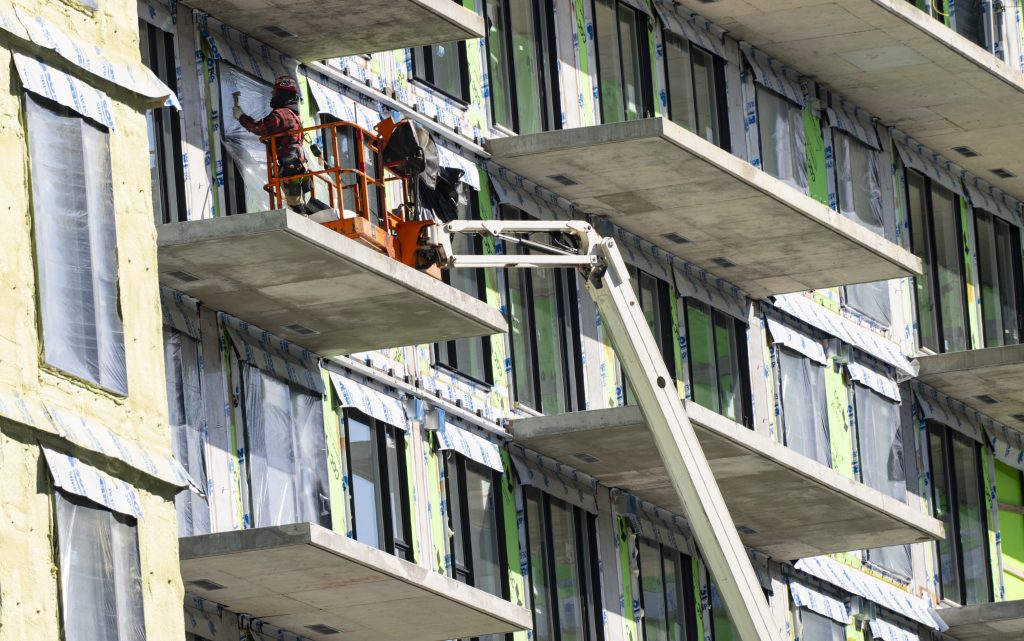2025 shaping up to be record year for Quebec’s construction industry

Posted December 16, 2024 12:20 pm.
The year 2025 is shaping up to be a record year for the construction industry in Quebec. And the residential construction sector, which has been lagging behind for some time, will finally regain momentum.
These are two predictions made by the Commission de la construction du Québec, in its portrait of the industry for 2024 and its forecasts for the coming year.
The CCQ thus expects the industry as a whole to record 211.5 million hours of work, compared to 210 million hours for the year 2024.
“We delivered in 2024 the equivalent of about forty Romaine — when you try to illustrate what 210 million hours means,” said Audrey Murray, President and CEO of the Commission de la construction, in an interview with The Canadian Press.
“We are heading towards a record year, economically, for the construction sector. These dynamics make me realize to what extent they are challenges and opportunities for our skilled workforce. We have a significant shortage of workers in all trades,” said Labour Minister Jean Boulet.
The industry employs approximately 200,000 workers.
By sector
Two sectors are expected to show an increase, namely residential and industrial. And two sectors are expected to show a decrease: the civil engineering and roadworks sector and the institutional and commercial sector.
Residential construction “is preparing for a recovery, driven by the drop in mortgage rates and the still-crisis need for housing,” notes the CCQ in its analysis. The Commission even predicts an increase of 7 per cent, which means that it would then record 38 million hours of work.
However, the main sector of the construction industry, namely institutional and commercial, will be more affected by the economic and political situation. The CCQ then predicts a decrease of 2 per cent in 2025, which would still give 116.5 million hours of work.
In its analysis, the Commission emphasizes that the institutional and commercial sector “will be affected by the expected slowdown in public investments.” Projects to build or renovate schools or hospitals have indeed been postponed due to budgetary restrictions.
But the CCQ president is not overly concerned about it. “The idea that the government spreads its investments out over time, with our workforce challenges… It remains very high. It’s not necessarily bad news; it could actually be good news and something a bit wise that’s happening,” said Murray.
“The needs remain there. The needs to maintain our infrastructure, the needs to renovate our schools, to build new schools, new hospitals, they’re still there. That’s not what’s being questioned; it’s really the way to spread it out over time,” she emphasized.
The civil engineering and roadworks sector should show a “slight decline that will be short-lived” in 2025, also being affected by declining investment intentions.
As for the industrial sector, “the rise continues” with a projected growth of 14 per cent in 2025 to reach 16.5 million hours. The Commission refers to the battery sector: “nevertheless, some uncertainties currently hover around the sector”.
Murray believes that the industry has managed to hold its own. “In recent years, the industry has been attractive. We have managed to attract, year after year, between 15,000 and 20,000 new people to meet (the needs) to have nearly 200,000 people active on our construction sites. It is not a perfect industry, but Quebec can still count on an industry that has been able to meet the challenge of recent years.”
Two unknowns
An economic unknown remains: the threat of 25 per cent tariffs on products exported to the United States, made by Donald Trump, and the effects that this could have on private and public investments in Quebec, if it were to be implemented.
Another unknown remains: that of the negotiations for the renewal of collective agreements in the industry, which have only just begun. The agreements will expire next spring; the 2025-2029 agreements must therefore be negotiated.
The Minister of Labour says he is optimistic. “We need to have a sustained dialogue, to once again embark on a process of finding solutions to avoid an impasse and avoid a labour dispute. I remain hyper-optimistic at all times and I will work in collaboration with the parties. I will try to be the best facilitator possible.”
–This report by La Presse Canadienne was translated by CityNews








